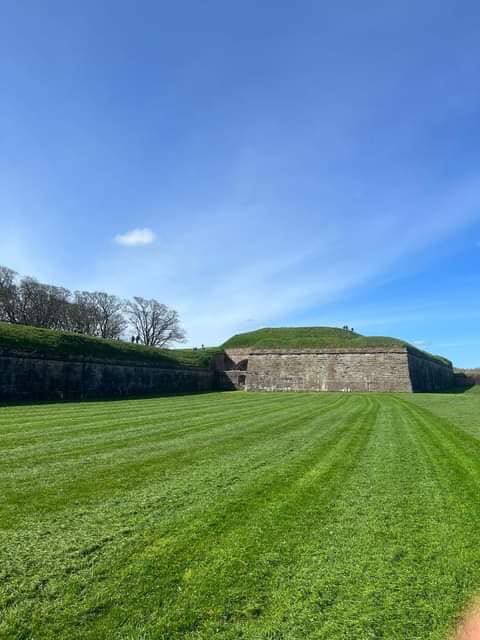The Stanks

The Stanks is the named given to a small grass area at the foot of the Elizabethan rampart walls of Berwick-upon-Tweed, Northumbria. The name of The Stanks derives from an ancient Scottish word meaning a ditch or a swampy place. The patch of rough grass is just about large enough for a football pitch to be marked out and it’s been the site of ad hoc football matches, mainly charity fundraisers, for over 100 years.
Prior to being infilled and grassed over the area of the pitch at The Stanks was originally the defensive moat between Brass Bastion and Windmill Mount Bastion, but in the 18th and 19th century had been turned over for another use entirely. The area tended to be in permanent shade so it was ideal to freeze it over and the local fishermen would dig out the ice they required to keep their hauls of salmon as fresh as possible on their journey south to London.
The current Berwick Charities Cup is played annually between May and July and has been contested continuously since 1948. It was nearly abandoned in 2017 when initially only nine clubs entered. But after publicity drive there was enough interest for the competition to take place. Even a crowd funding page was set up to help local charities cater for the anticipated shortfall in funding provided by this tournament. The competition raises annual sums of between £5,000 and £8,000. The competition also ran into problems in 2004, when there was a shortage of referees following two regular whistlers pulling out due the abuse they had endured having given their services free of charge. One match was even abandoned that year when two players from Greenlaw Geriatrics were sent off, and then furious spectators surrounded the referee.
The Stanks was no stranger to fundraising football matches beneath its historic walls. From 1922 there was and annual tournament for the Berwick Infirmary Cup. Cinematic footage exists of the final between Eyemouth Rangers and Belford which took place on June 29th 1929. This article features stills from that incredible footage where several thousand people gather to watch the match. The man with the trophy is quite possibly Councillor W.J. Dixon, who provided the sizeable cup for the competition.



